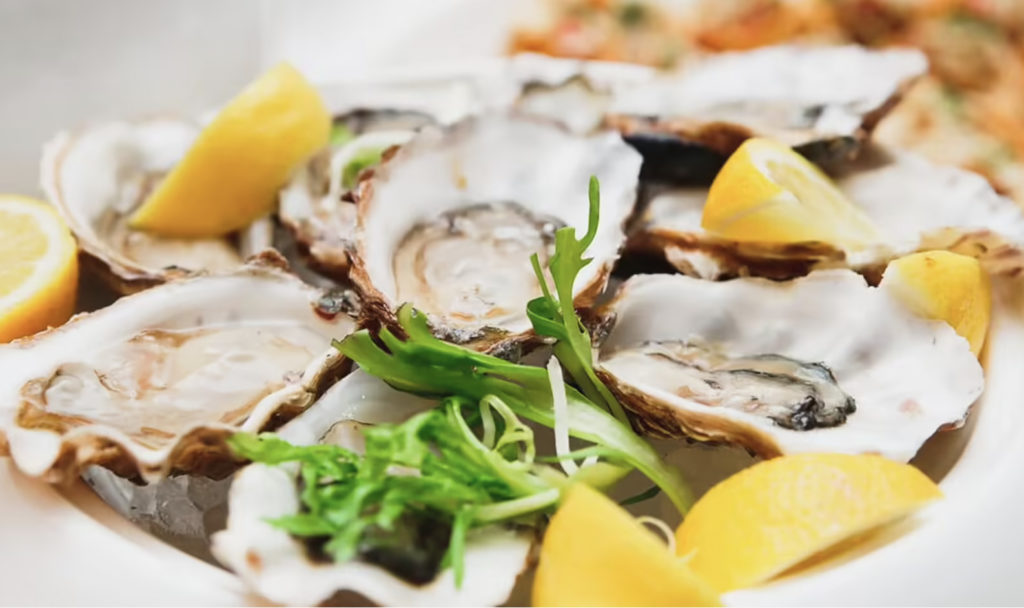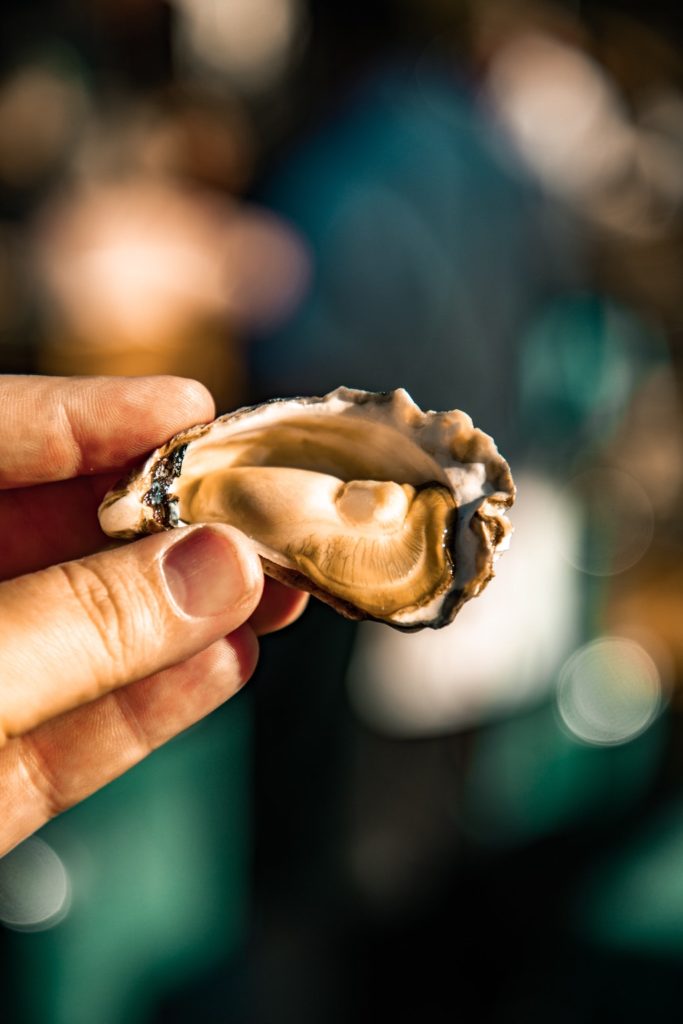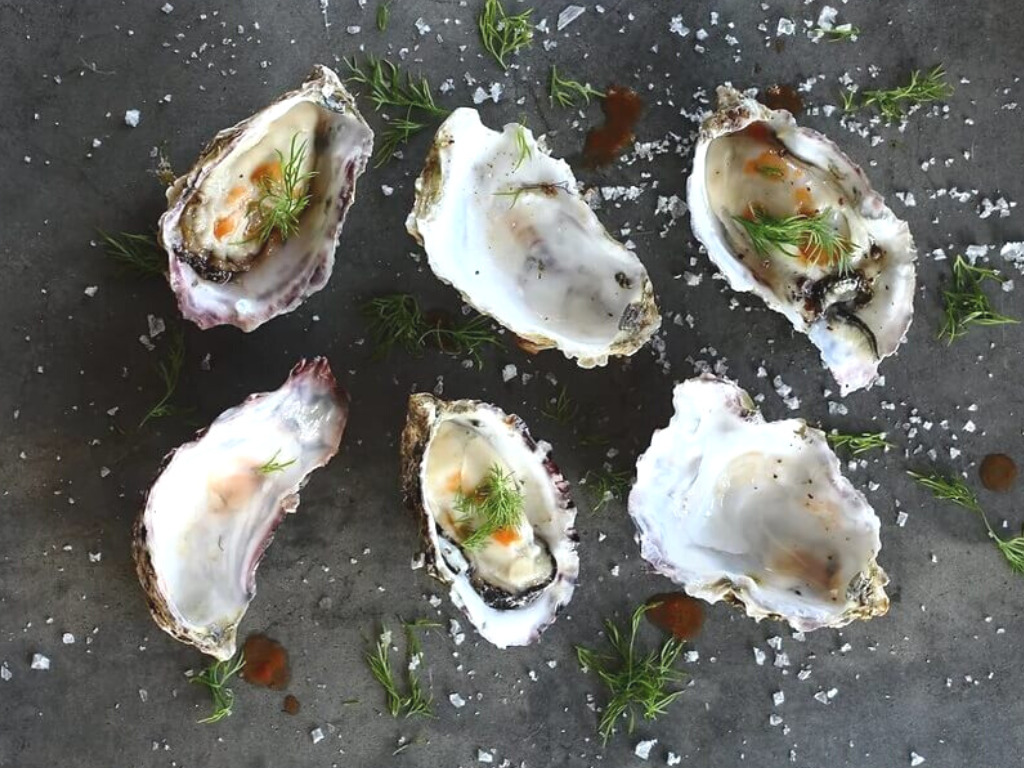5 Mins Read
Are lab-grown oysters coming to a plate near you? That’s the hope for Nikita Michelsen and marine biologist Joey Peters, the co-founders behind the cultivated oyster meat seafood startup, Pearlita Foods. For now, though, they’re starting with vegan oysters made from mushrooms and seaweed.
The Raleigh, North Carolina-based startup is working to develop cultivated oysters—Pearlita says it’s the first cultivated meat company to tackle oysters and oyster shells. The company is a funding recipient of Sustainable Food Ventures and Big Idea Ventures New Protein Fund.
The company revealed its first prototype last week, an oyster made from mushrooms and seaweed. But the plan is to integrate cell-cultured technology along with the fungi and seaweed, once there’s regulatory approval for cultivated meat products.
Pearlita is also producing a biodegradable oyster shell that requires no shucking. That’s still in development, so the company is using real oyster shells to showcase its products for now.
“Instead of harvesting and killing oysters from the sea we grow them, using cellular agriculture. Just as animals would, we are creating a mixture of nutrients to raise cells in a controlled environment free of disease or chemical contamination. By culturing cells we are providing a new untapped source of seafood, which is meant to support wild populations by reducing the impact from fishing” Peters said in a statement.

The company recently secured investments from CULT Food Science.
“We are impressed by and proud of Pearlita’s successful production of its first cultivated oyster prototype. Pearlita’s commitment to making the world a better place and doing its part to increasing the world’s food security is encouraging as we possess the same goals,” Lejjy Gafour, CEO of CULT Food Science, said in a statement.
“Pearlita is taking great steps to advance the production of cultured seafood on a mass scale. We are energized by the positive contributions that their team is making to the cellular agriculture industry.”
Oysters in the ecosystem
The founders say they chose North Carolina as their headquarters because it is the second-largest estuarine system in the U.S., as well as the fastest-growing hub for biotech and future foods.
“So we will be close to the ecosystems where oysters thrive and amongst other entrepreneurs—both which we believe will accelerate our growth,” says Michelsen.
Oysters play critical roles in their ecosystems. They clean and filter the water—an adult oyster can clean as much as 50 gallons of water per day. They can filter sediment and nitrogen that can make water unsafe for other marine animals.
Overharvesting for human consumption has seen oyster populations decline in key areas around the world. According to the National Park Service, 85 percent of oyster reefs are gone. And as oceans face a growing number of threats from pollution and acidification to biodiversity loss, keeping populations for critical ecosystem-supporting species like oysters intact is crucial to the future of our oceans, experts say.

“By using cell cultivation we are hoping to grow oysters efficiently, without adding any burden to wild populations, so that they can continue to perform their important ecosystems services – like carbon sequestration” adds Michelsen. Further, Pearlita’s oysters would have a far less toxic profile. “Oysters in polluted water ways are known to store contaminants and toxins in their tissues. Ours would be contaminant free.”
Pearlita says cultivated oysters would remove much of the burden on our oceans and marine life that wild harvesting and farming cause. The company says this would decrease the footprint from farm-raising oysters, significantly—oyster farming comes with a host of problems, including reducing nutrients from the water column, as well as competing with other organisms for survival, which can lead to environmental degradation, according to a recent report from the University of Massachusetts.
“It made so much sense to me,” Nikita Michelsen, founder and CEO of Pearlita Foods, said in a statement. “We have acidification and rising temperatures in the ocean.”
Despite the strides made in the cultivated meat space, reproducing bivalves have proven more difficult, says the Pearlita team, because the tissues are so complex. Pearlita says it’s the complexity of the tissues that makes oysters a desirable food to begin with.
“Pearlita is going to deliver something very unique,” says Stephanie Michelsen, advisor to Pearlita Foods and CEO of Jellatech. “By utilizing novel cellular agriculture, they will make one of the highest premium proteins accessible,” she says.
Cultivated seafood
Like the plant-based protein category, cultivated meat has largely been focused on beef and chicken replacements, with much success. Eat Just’s cultivated Good Meat received regulatory approval in Singapore in 2020 and began selling to consumers since. Upside Foods recently launched a factory it says can produce 400,000 pounds of cultivated meat per year, once it has U.S. regulatory approval.
While a fraction of the bigger cultivated meat market, cultivated seafood is making a splash in the cell-based industry. U.S.-based BlueNalu has been working to prepare for launches in Europe and Asia with its cultivated seafood. And Bay Area startup Wildtype says it has secured distribution deals for its cultivated salmon once it received regulatory approval. Pearlita says it plans to develop other types of sustainable seafood, including squid and scallops.

As to when that may happen, the industry is still uncertain but hopeful. At best, it will likely be at least 12-18 more months before there’s full FDA approval. But the industry is ready. “We’re rising to this challenge,” Wildtype co-founder Justin Kolbeck, said earlier this year, “and are excited to introduce our products to the public very soon.”
Pearlita is ready, too.
“Although this is a huge challenge we plan to build a passionate team with the unique culturing expertise in this niche field to produce this novel, sustainable seafood,” Peters said. “With support from investors I have no doubt we will accomplish great things.”
Lead image by Louis Mornaud on Unsplash



